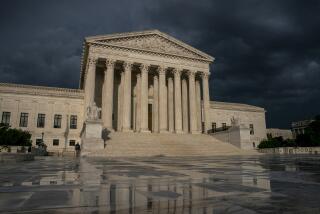SEC to Seek Settlement of Hutton Case Without Fine
- Share via
NEW YORK — Securities and Exchange Commission sources confirmed Friday that the agency staff is proposing to seek an injunction barring E. F. Hutton from future violations of securities laws, without fining or penalizing it further for a check-kiting scheme to which it has already pleaded guilty.
The proposal, which is to be presented early next week to the commission, resembles the “consent decrees” with which the SEC settles many securities fraud cases. Generally, defendants in those cases agree to the injunctions against fraud without admitting or denying the specific charges; sometimes a fine or penalty is involved.
The staff recommendation, first reported Friday by the Wall Street Journal, also includes an extension of the temporary exemption from federal rules barring those convicted of investment-related misdeeds from functioning as an investment adviser or as a principal underwriter on some securities issues.
Hutton pleaded guilty on May 2 to 2,000 federal counts of felony mail and wire fraud stemming from its practice of habitually overdrafting its bank accounts to maximize its interest income.
As part of the plea, Hutton hired former U.S. Atty. Gen. Griffin Bell to conduct an independent probe. In his report last month, Bell blamed five top executives and seven regional and branch managers for the fraud but exonerated Hutton Chairman Robert Fomon of direct responsibility.
Following its plea, the firm faced disciplinary actions by several states; most of them are expected to go easy on Hutton in light of Bell’s findings and the scarcity of evidence that any Hutton customers suffered losses directly attributable to the overdrafting.
In a statement Friday, a Hutton spokesman noted that the firm has a pending application before the SEC for an extension of its temporary exemption or, preferably, a permanent exemption.
“We hope and expect the commission will act no later than Oct. 29,” the date its initial 180-day extension expires, the firm said.
Times staff writer Robert L. Jackson, in Washington, also contributed to this article.
More to Read
Inside the business of entertainment
The Wide Shot brings you news, analysis and insights on everything from streaming wars to production — and what it all means for the future.
You may occasionally receive promotional content from the Los Angeles Times.









